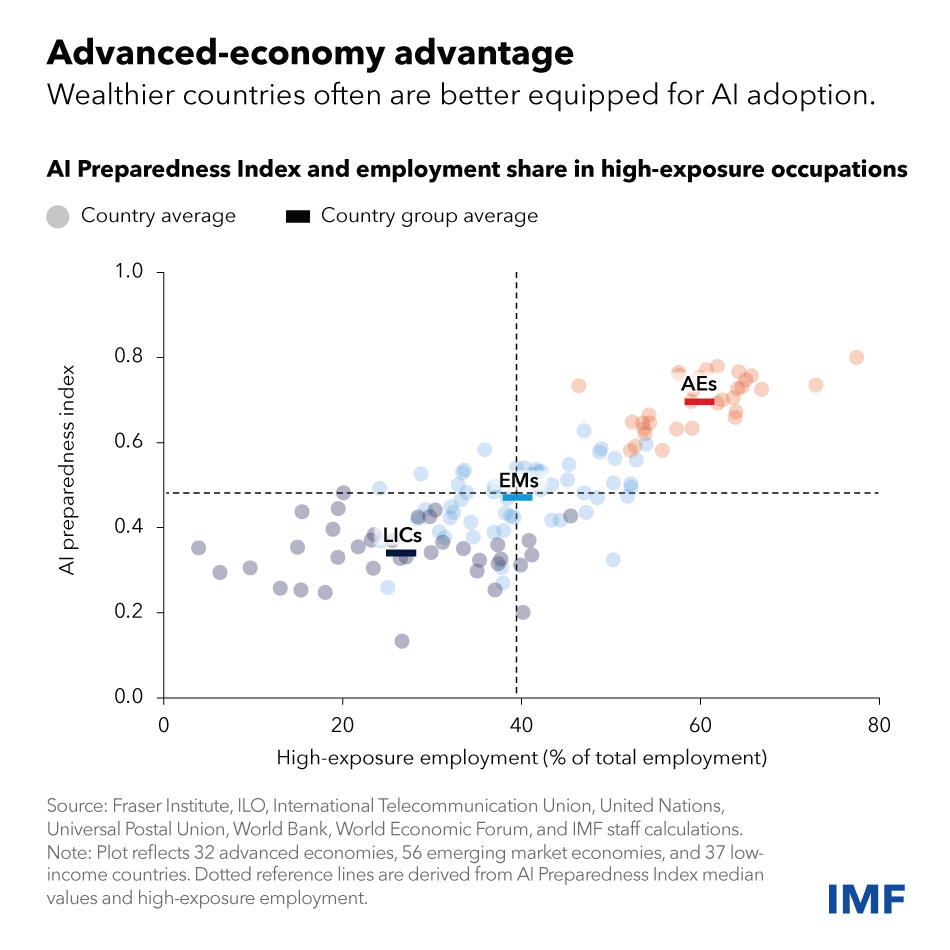IMF Warns of Worsening Income Inequality Due to AI – How will it Impact the Ag Sector?

In the midst of a global technological revolution, the potential for artificial intelligence (AI) to reshape economies is both thrilling and concerning. As we navigate the complexities of AI, it becomes imperative to explore how this transformative technology can revolutionize the agricultural sector, particularly in the context of Africa.
The Impact of AI on Global Labor Markets
Before delving into the specifics of agriculture, it is crucial to understand the broader implications of artificial intelligence on the global economy. According to recent analysis by the International Monetary Fund (IMF), nearly 40 percent of global employment is exposed to artificial intelligence. Unlike previous technological advancements, AI has the unique capability to impact highly skilled jobs, creating both risks and opportunities.
In advanced economies, where approximately 60 percent of jobs may be affected by artificial intelligence, there is a dual prospect of job enhancement and displacement. Meanwhile, emerging markets and low-income countries face a lower immediate disruption rate of 40 percent and 26 percent, respectively. However, the lack of infrastructure and skilled workforces in these regions poses a risk of exacerbating global inequality over time.
AI’s Influence on Inequality and the Labor Market
The IMF’s findings also suggest that artificial intelligence could exacerbate income and wealth inequality within countries. As AI becomes integrated into businesses worldwide, there is a potential for polarization within income brackets. Workers adept at harnessing artificial intelligence may experience increased productivity and wages, while those unable to adapt could fall behind.
To mitigate this risk, policymakers are urged to establish comprehensive social safety nets and retraining programs for vulnerable workers. The goal is to ensure an inclusive transition to an AI-driven world, protecting livelihoods and curbing inequality.
AI Preparedness Index: Crafting Inclusive Policies
The AI Preparedness Index, measuring readiness in key areas such as digital infrastructure, human capital, innovation, and regulation shows that wealthier economies, including advanced and some emerging market economies, tend to be better equipped for AI adoption. However, there is considerable variation among countries.
For advanced economies, the focus should be on prioritizing AI innovation and integration while developing robust regulatory frameworks. In contrast, emerging markets and developing economies need to lay a strong foundation through investments in digital infrastructure and a digitally competent workforce. By doing so, we can cultivate a safe and responsible artificial intelligence environment that maintains public trust.
READ: Top Technology Trends That Are Revolutionizing Agriculture
AI in African Agriculture: A Game-Changer
In the agricultural sector, artificial intelligence holds immense potential to address critical challenges faced by Africa, including low productivity, unpredictable climate conditions, and inadequate infrastructure. The integration of artificial intelligence technologies can bring about transformative changes in the agricultural sector.
For example, in precision agriculture, AI-driven technologies such as drones and sensors provide real-time data on soil conditions, crop health, and weather patterns, enabling informed decision-making and resource optimization.
AI can also be used to optimize the supply chain with AI algorithms that can predict market demands, optimize logistics, and minimize post-harvest losses, benefiting farmers and contributing to national food security.
In smart farming practices, AI-powered applications can assist farmers in remotely monitoring and managing their farms, from automated irrigation systems to predictive analytics for disease control.
Tailoring AI Adoption to African Realities
Contrary to concerns about global income inequality, Africa has the potential to bridge the gap through thoughtful AI integration in agriculture. Tailored solutions addressing crop diversity, regional climate variations, and socio-economic contexts are essential. Capacity building initiatives and investments in digital infrastructure, especially in rural areas, are imperative for successful AI adoption.
Despite IMF’s warning of potential inequalities, Africa can chart a different course by leveraging artificial intelligence to foster inclusive growth. The emphasis should be on empowering smallholder farmers, a significant portion of the agricultural workforce, with AI tools and knowledge. Governments, in collaboration with private stakeholders, can play a pivotal role in ensuring equitable distribution of AI benefits.
As Africa stands at a pivotal juncture, the transformative power of artificial intelligence in agriculture offers a unique chance to leapfrog traditional development barriers. Embracing artificial intelligence with a tailored approach can not only bridge technological gaps but also pave the way for building a resilient and prosperous agricultural future. In this AI-driven era, Africa has the opportunity to pioneer a sustainable and inclusive agricultural ecosystem that sets a global standard for progress and equity.



